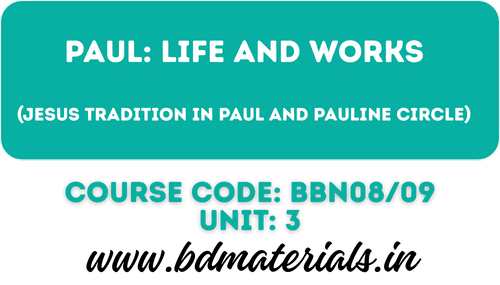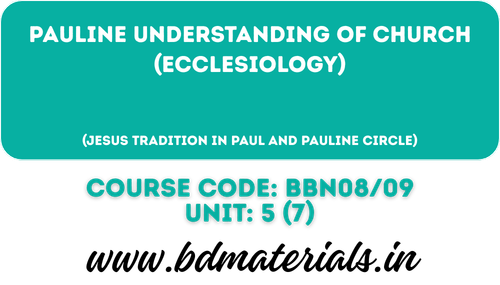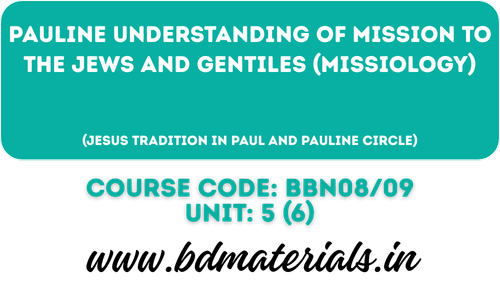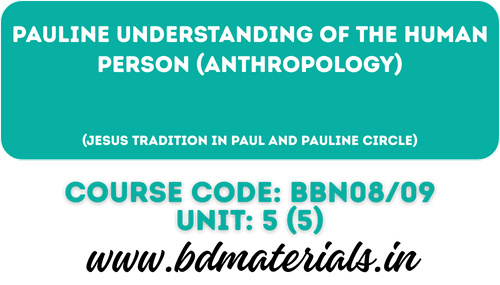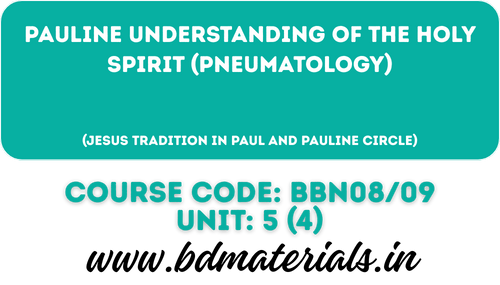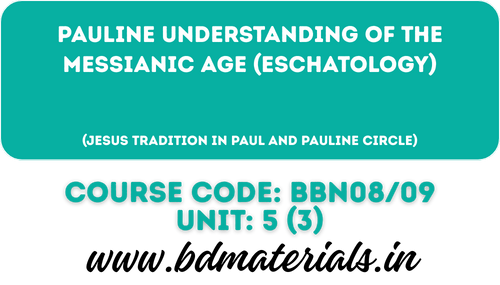Paul Life and Works
Introduction
This paper is present to the Paul life and work of his mission and how he knows the Jesus Christ.
1. The life of Paul:
Paul was born at Tarsus in south-east Asia Minor. His birth was into a rich and varied environment, which included the religion of the Hebrews, the civilization of administrative genius of the Romans, of which he was proud when he became an apostle. Saul’s forefathers had migrated from Jerusalem to Tarsus. Sir William Ramsay gives some information on his family’s privileged standing. According to his theory, Antiochus Epiphanes1, a Seleucid ruler, had renamed Tarsus as Antiocheia and allowed the Jews to settle there in a large colony in 17-170 B.C.E. Under those circumstances, that colony of Jews must have been given some good measure of responsibility in the affairs of the city. The people and families of the colony would have established themselves to become influential and powerful in the city. Ramsay suggests that Saul was born into one of those “original’’ families of Tarsus. Saul was a Roman citizen by birth. Possibly one of his ancestors might have received the Roman citizenship for the great service rendered to the Roman army in Syria for supplying tents. 2The Roman citizens in a provincial city commonly filled the position of high-class citizens and this fact strengthen the view that Saul belonged to a family of wealth and position. Most of the scholars locate Saul’s birth sometime between C.E. 6 and 10. If the approximate date is C.E. 8, it will make Saul about 10-15 years younger than Christ. Some of the major church traditions today accepted C.E. 8 as Saul’s birth year.
2. Tarsus, Paul’s Birth Place
Paul himself did not record the name of his birth place, but it was Luke wrote in Acts 21:39, in a context where a military commander treated him imperiously, “I am a Jew born in Tarsus in Cilicia, a citizen of an important city and again while addressing a crowd, Paul said I am a Jew, born in tarsus in Cilicia (Acts 22:3) in 64 BCE tarsus was made the military headquarters of Pompei the roman general who cleared the sea from the hands of pirates and the roads from the clutches of brigands.
3. Paul’s Education and Training:3
Saul had all the possibilities to have earned the best education first in tars and then in Jerusalem. After his basic education in tarsus, he was sent to Jerusalem for higher education perhaps to become a” Rabbi ‘it is also said that Saul was sent to Jerusalem in his youth by his parents in order to be immunized against the infection of the Hellenistic world that place of evil waters which brought death to those who drunk from them and caused the name of god to be profaned.
4. Paul as a Self-Supporting Tent-making Missionary
Paul is generally studied and understood as a writer of some outstanding theological letters and a ceaseless traveler-missionary through the breadth and length of the Roman Empire. He is hardly envisaged as someone who spent long hours of day and night working manually.°’ Nevertheless, that is precisely what he often did according to his own testimony, “You remember our labor and toil, brothers and sisters4; we worked night and day, so that we might not burden any of you while we proclaimed to you the Gospel of God” (cf. 1 Thess 2: 9). R. Hock specifically portrayed Paul as the Tentmaker, which was quoted by Bermejo:
We begin to realize that, far from being at the periphery of his life, tent-making was actually central to it. More than any of us has supposed, Paul was Paul the tentmaker. His trade occupied much of this time – from the years of apprenticeship through the years of his life as missionary for Christ, from before daylight through most of the day. Consequently, his trade in large measure determined his daily experiences and his social status. His life was very much that of the workshop. ..of lather, knives and awls; of wearing toil; of being bent over a workbench like a slave and working side by side with slaves; or of thereby being perceived by others and by himself as slavish and humiliated; of suffering the artisan’s lack of status and of being reviled and abused Paul the apostle practically used his Tentmaking5.
5. self-supporting strategy during his apostolic ministry6
We have already studied in the previous chapter that like any other Jewish youth of his time, Paul also learnt a trade along with his religious studies. In fact, we may say that he had specialized in the Tentmaking job. He chose this profession to support himself during his ministry.‘° Luke, a companion of Paul, wrote in Acts 18:3, ‘Paul went to see them, and, because he was of the same trade, he stayed with them, and they worked together — by trade they were tentmakers.’ For Paul, the self-supporting ministry is one of the signs of a true apostleship, which no one could question. Paul says in another context to the Corinthians, ‘the signs of a true apostle were performed among you with utmost patience, signs and mighty works. 7How have you been worse off than the other churches except that I myself did not burden you?’ (cf. 2 Cor 12: 12-13). Paul’s trade also gave him a joyful pride to feel free from the accusation that he was preaching the Gospel to make his living (cf. 1 Thess 2: 3-6).°* Paul always refused to be controlled by others with regard to his financial needs. He was not one who would take undue advantage of others’ generosity (cf. 1 Thess 2: 5; Acts 20: 33-34)
6. Paul preferred his tent-making
work was that the leather workshop gave him a place and opportunity to meet many people with whom he could share the Gospel and discuss various theological issues. It was possible because Paul’s trade of tentmaking enabled him to stay longer in one place.‘® A. Behera says that this kind of leather workshop was recognized as a conventional social setting for intellectual discourses.°’ He cites examples saying that Socrates discussed justice in a saddler’s shop and Crates the Cynic used to read in Philiscus’ shoemaking shop. Plutarch, the first century Greek biographer also assumed that such worksho op was a conventional social setting for intellectual activity. “ William Carey dreamed about the world mission in his boyhood as a shoemaker while he worked in the leather workshop. Further, it is suggested that Paul could write at least some of his letters from his leather workshop. E. Randolph Richards comments that: Paul wrote at least some of his letters during down time in the tentmaker’s shop. For example, in Corinth Paul is sometimes described as discussing the issues with his partners Aquila and Priscilla as they laboured together over tents (cf. Acts 18: 1-3), but neither Aquila nor Priscilla was ever listed as the co-sender of a letter.8 The point remains, though, that perhaps Paul wrote in a workshop. ‘Thus, we find that Paul used his tent-making trade as a golden opportunity for communicating his new found philosophy of life, “the Gospel of the resurrected Christ, to as many people as possible. The leather works were very common among the slaves in the Roman Empire. As the Tentmaking profession was useful for the Roman army, so also it was popular among the civilians. While Paul’s tents were used by soldiers to make tents for their camps, the oarsmen too would pitch their tents for several days while their homes.
Paul’s favorite Tentmaking had a good demand in all walk of life, which was definitely an advantage for Paul. Because, ; large number of customers would flock to his workshop and he would be able to communicate his Gospel to all who would come in contact with him through his tentmaking profession. As a sincere man of work, whatever he produced must have been appreciated and loved by all. Hence, for Paul, the Tentmaking was not only a self-supporting and favorite work, but also a great opportunity for imparting the Gospel in a very meaningful way.
Conversion of Paul
The most significant event in Paul’s life was his encounter with the risen Christ near Damascus. This event changed his beliefs, perspectives and values and entirely transformed his life. The * Damascus event compelled him to proclaim the Christ whom he had previously persecuted and it convinced him to take the Gospel to the Gentiles.
7. The Damascus Event
The description of Acts about Paul’s encounter on the Damascus road is presented by Luke in the model of Old Testament theophanies. Luke recounts the Damascus experience of Paul three times, the first in a direct narration (Acts 9:1-19), and the other two in Paul’s defence speeches (Acts 22:3-21: 26:9-18). Even though the three accounts do not agree in some of the details, the inner content remains the same and agrees with Paul’s version that he saw a brilliant light in the sky, that he fell to the ground, that he heard a voice which identified itself as Jesus and that he was left blind. (cf. Gal 1:11-24; 1 Cor 9:1-15; 2 Cor 4:4-6; Phil 3:7-8, 12). 9
8. Background of the Event
It is suggested that when Paul began to ravage the Christians, he might have gone through some direct or indirect encounters with the followers of Christ, which might have prepared him for the. dazzling encounter of the risen Christ. One suggestion is put forward that Paul, while beating and imprisoning the believers in Christ, would very likely ask from the believers the reasons of impact which Jesus had made on them, and in response he would have heard from them stories of what Jesus had said and done in Galilee. It is also likely that he would have been present among “those from Cilicia” who argued with Stephen and could not withstand the wisdom and spirit with which Stephen spoke (cf. Acts 6: 9-10). Finally, the conviction with which Stephen stood firm in his faıth in the risen Lord Jesus, even at the point of his death, would definitely impress the young mind of Saul, who was standing at the spot where Stephen was being stoned and was approving his murder (cf. Acts 7: 54-8: 1). Even there might have been others also besides Stephen, whose testimonies of faith could have impressed the mind of Paul deeply. At last Paul began his jo…
9. Date of Conversion
Scholars offered various dates for Paul’s conversion. According to Bornkamm, it took place around 32 A.D, and Dahl would suggest a date in the early thirties, a couple of years after Christ’s death.Fitzmyer related it to Stephen’s martyrdom and hence, about 36A.D. So we can assume that it took place some time between’30 to 37A.D.
10. Paul’s First Missionary Journey
Luke records the three missionary journeys of Paul in smooth sequence. He records the first Missionary Journey of Paul in Acts 13: 1–14:28, in which Paul’s companions were Barnabas and John Mark. The places visited by them in this journey were Antioch on Orontes and Seleucia in Turkey. This journey took place c47 C.E. As Paul and Barnabas were commissioned (Acts 13: 1-3), they preached in Cyprus (13: 13-52), they worked in Iconium, Lystra, Derbe and then returned to Antioch (14: 1-28).
11. Paul’s Second Missionary Journey
In Acts 15: 36-18: 23, we find this journey. Paul’s companions 8 were Silas, Timothy (from Lystra) and Luke (from Troas). In thig journey Barnabas was separated with Mark and who went to Cyprus. The places visited by Paul’s team starting from Antioch on Orontes were Syria, Cilicia, Derbe, Lystra, Iconium, Phrygia. Galatia region opposite Mysia, Troas, Samothrace, Neapolis, Philippi, Amphipolis, Apollonia, Thessalonica, Beroea, Athens Corinth, Cenchreae, Ephesus, Caesarea and Jerusalem and returned to Antioch on Orontes.
12. Paul’s Third Missionary Journey10
In Acts 18: 23-21: 16, this journey is narrated. Paul’s companion; were Silas, Timothy and Luke. The places visited beginning from Antioch were the Phrygia-Galatia region, Ephesus, Macedonia, Greece, Philippi, Troas, Assos, Mitylene, Samos, Miletus, opposite Chi…
13. How it influenced Paul’s Gentile Mission
Paul took his experience of divine revelation in the fashion of God’s call to the prophets in the O.T. (Gal 1:15; Jer 1:5; Isa 49:1). He considered it a direct call from God to become an apostle of Christ to the Gentiles. Paul accepted this call as equal to that of the 12 Apostles. So, he often compares this appearance of the risen Lord to him with the resurrection appearances granted to the twelve (I Cor 9:1; 15:5-8; Gal 2:7-9). He was fully convinced of his vocation as an apostle. Most of his letters start with the phrase, “Paul, called to be an apostle of Christ Jesus” (Rom 1:1; 1 Cor 1:1; 2 Cor 1:1 Paul traveled approximately 3, 497 kms, about 2722 kms by road and 775 kms by sea
14. Paul’s Death :
It may be that Paul’s appeal came up for the hearing at the end of his two years in Rome: But we have no direct information about the result. It may be that Paul’s life was brought to an end in Rome by the executioner’s sword, but the tradition associates his execution with the persecution of Christians in Rome which followed the great fire of A.D. 64, at least two years after the latest probable date for the hearing of his case.
“During the night of July 18/19 in 64 C.E., a fire broke out at the north-east end of the circus maximus. The shops which stood round the outer face of the circus was full of inflammable wares, the conflagration began there and as fanned by the wind the fire raged for five days, until out of 14 divisions of the city three were fully . destroyed and seven severely damaged. Nero, who was at Antium when the fire broke out, hurried back to Rome and instituted energetic relief measures. There were rumours that at Nero’s instruction the city was put on fire in order to remould the city to his heart’s desire. At last to escape from being the target of suspicion he looked for scapegoats. Tacitus a reliable witness said that to scotch the rumour, Nero substituted as culprits and punished with the most refinements of cruelty a class of men whom the crowd styled or called Christians. Most possibly Paul was one of the victims among those early Christian martyrs.
Conclusion:
the life and work of the Paul is very good in before the he doesn’t know the Jesus Christ he kill the many people those who are believes in Jesus but after hi know the Jesus Christ he in Jesus he do very good work by the power of holy spirit in his life we will lean meny thing that we are the Christian we will also the do work like him.
BIBLIOGRAPHY
- Barclay, William. The Daily study Bible. The Letter to the Roman. Bangalore: theological publications in India,1987
- Carson, Thomas, Joann, Cerrito.Eds New Catholic Encyclopaedia. Second Edition. 11. Washington: Gale 2003.
- Gaebelein,Arno Clemens, The prophet St.paul.New York: our Hope,1939.
- Hanton,Dipankar ,New Testament Revisited.Raghabpur: Raghabpur seva Niketan,1991
- Knox, Wilfred L.St.paul and Churches of Jerusalem.Camridge; University pree,1925
Footnotes
- Charles A.Anderson scott,saint paul,the man and the Teacher (Cambridge:University press,1936)5.
- W.M.Ramsay,St.Paul the traveller and the Roman Citizen ( Grand Rapids:Baker,1972).32
- Amo Clemens Gaebelein,The Prophet St.Paul (new York:our Hope,1939)31,
- Thomas Carson, Joann Cerrito,eds New Catholic Encyclopedia,second Edition,Vol.11(Washington Gale,2003)p.2
- Wilfred L. knox , St. Paul and the Churches of Jerusalem [Cambridge:Carson…, NCE…,2.
- Ricciotti, Paul….,187
- Bermejo, Paul…, 187.
- Thomas Manjaly, “Paul’s Ways of Communti Building,” Relevance of Saint Paul: AN Indian Reading of His Letters, edited by Kurien Kunnumpuram & Rekha M. Chennattu [Mumbai: St. Paul’s, 2009], 216-217.
- A caravan is a company of travelers across the deserts.
- Dipankar Haldar, New Testament Revisited (Raghapur: Raghapur Seva Niketan, 2008,) 48-52.
Friendly Note
Greetings in the name of our Lord Jesus Christ! We are deeply thankful for your visit to BD Materials. It is our mission and joy to serve Bible students, pastors, and believers with high-quality theological resources that strengthen faith and understanding of God’s Word.
At BD Materials, you’ll find study notes, articles, question papers, and valuable academic content designed to support your biblical and theological education. We are dedicated to helping you grow in knowledge, ministry, and devotion to Christ.
We also invite you to explore our partner sites: Telugu Gospel Lyrics, featuring inspiring gospel song lyrics in Telugu, and Theological Library, a hub for Christian book summaries and devotionals.
Your encouragement means a lot to us! We invite you to share your study materials, articles, or insights with our community. Thank you for being part of this mission—may God bless your studies and ministry abundantly!
